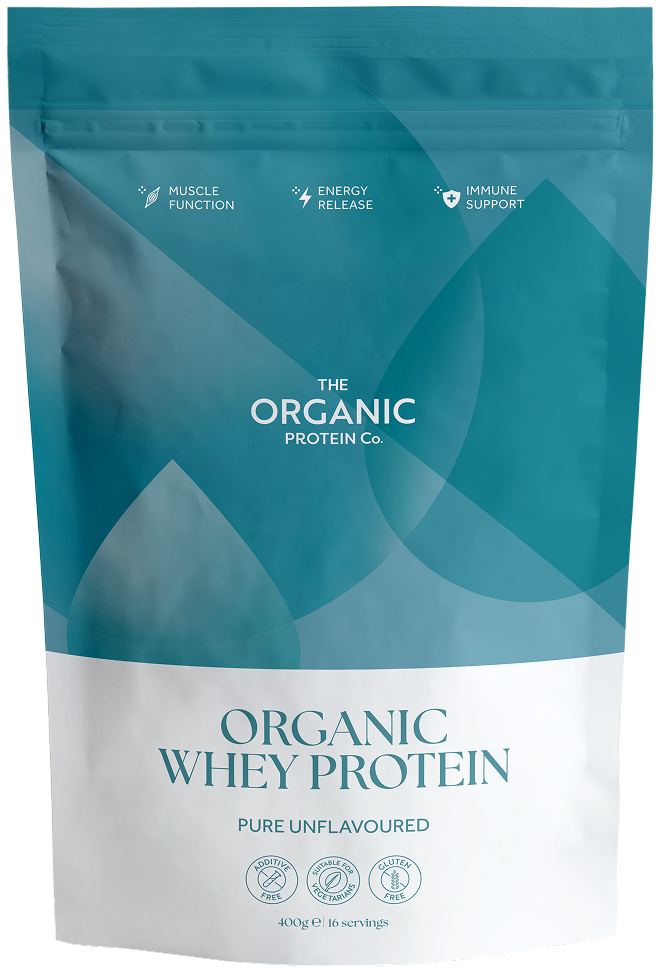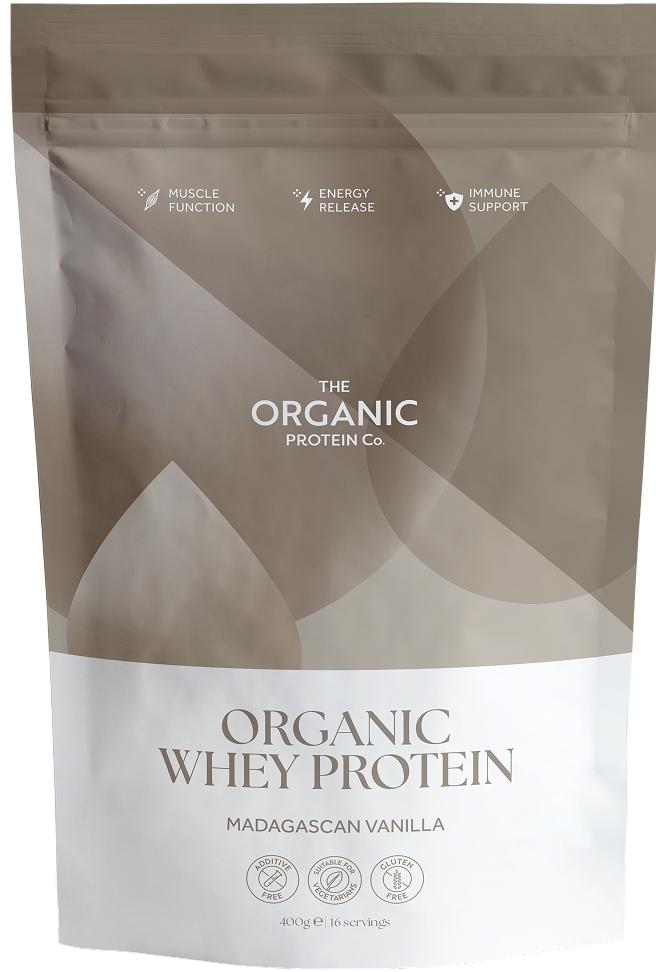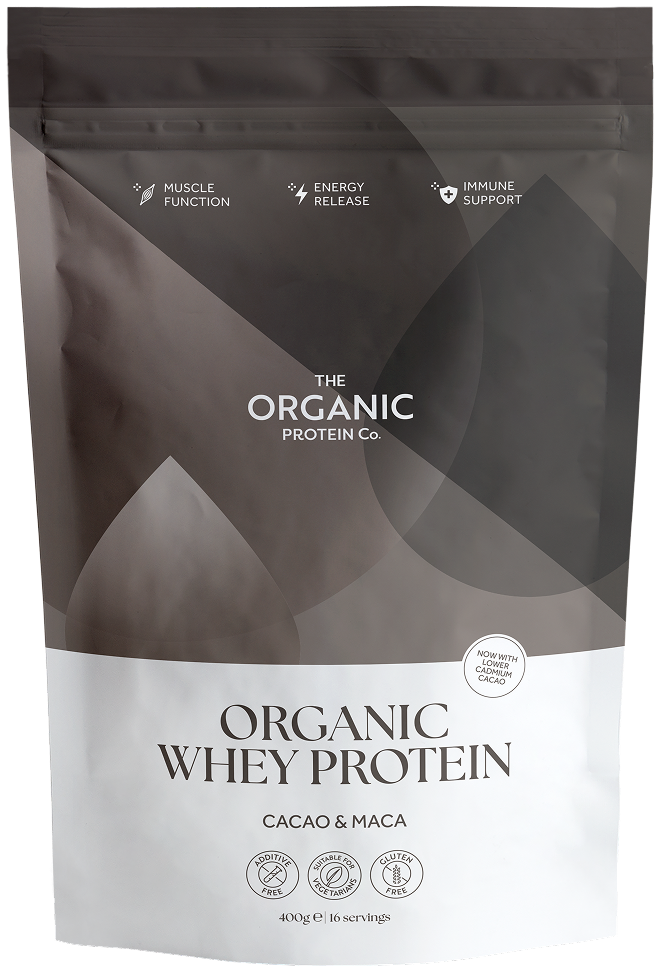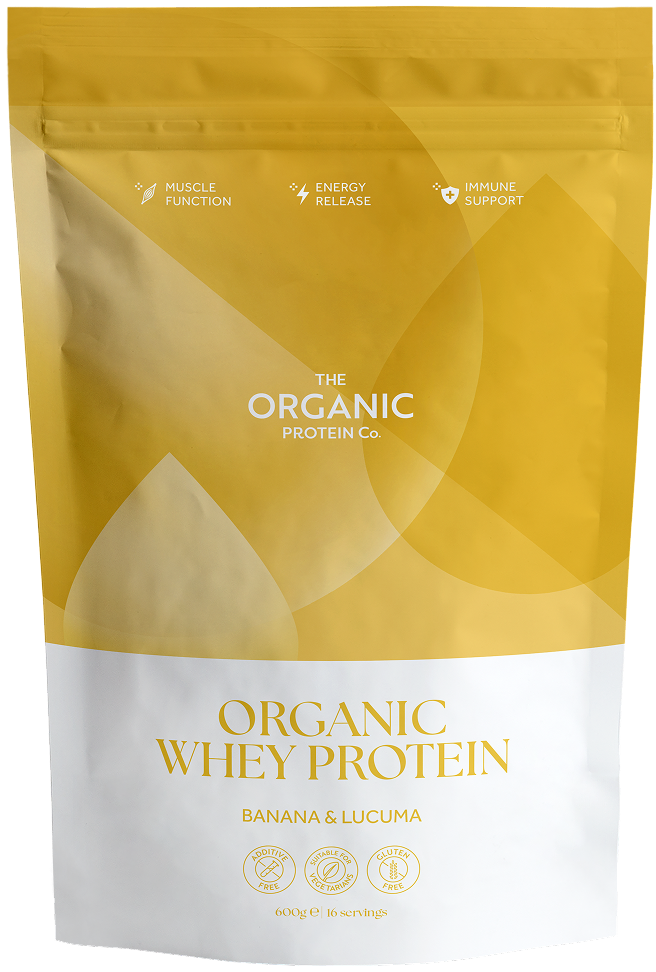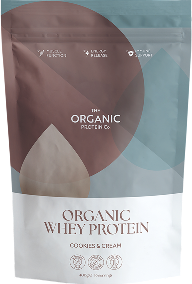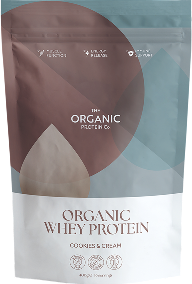Protein is one of the body’s essential nutrients, supporting muscles, bones, hormones and enzymes. For people looking to boost their intake, whey protein is one of the most popular and widely researched supplements. But what exactly is whey protein, and is it safe to use?
What is Whey Protein?
Whey protein is a high-quality protein naturally found in cow’s milk. It contains all nine essential amino acids, including branched-chain amino acids (BCAAs) such as leucine, isoleucine and valine, which play a role in muscle repair and growth.
Whey protein is rapidly digested and absorbed, which makes it a convenient choice in terms of nutrition and general health.

How whey protein is made
Whey is a byproduct of cheesemaking. Cow’s milk undergoes traditional fermentation, which separates it into solid curds and liquid whey. While the curds are processed separately to create cheese, whey is chilled and stored ready for upcycling into whey protein.
At The Organic Protein Co., the whey is filtered to remove most of the fat and lactose, leaving a protein-rich whey. After gently heating to remove excess liquid, it is then briefly spray dried to form a powder that retains the protein’s nutritional goodness and creamy taste.
Why people use whey protein
Many people turn to whey protein for its practical and health benefits. We know that protein supports overall muscle health and recovery, and boosts immune function. It has also been shown to reduce the release of hunger hormones, which may aid weight management.
For busy lifestyles, whey protein offers a quick and convenient way to increase protein intake in addition to a healthy diet.
Is Whey Protein Safe for Daily Use?
Whey protein has been extensively studied in relation to sports nutrition and general health. To understand whether it’s safe for everyday use, it helps to look at NHS guidance and evidence-based clinical recommendations.
What health authorities say about daily protein intake
The Eatwell Guide from the NHS recommends that we eat portions of protein each day, which may include meat, eggs, fish, pulses, beans or soya, as part of a healthy, balanced diet. Milk and dairy foods are also noted to be good sources of protein.
According to UK Government Dietary Recommendations, adult women aged 19-64 need around 45g or protein per day, while men of the same age need roughly 55.5g per day.
While these needs can usually be met through a balanced diet, supplements such as whey protein can be helpful in times of higher protein requirements, such as during recovery from illness or for elderly nutrition purposes.
How much whey protein is typically studied in research?
Clinical trials often study healthy adults consuming more than 1.2g of protein per kilogram of body weight per day, especially in studies of muscle growth or weight management. This is a greater quantity of protein than the Government recommendation, which may provide reassurance about the overall safety of introducing more protein to your diet.
Is whey protein safe to use every day for healthy adults?
For most healthy adults, daily whey protein use is considered safe in moderation. Research shows that incorporating whey as part of a balanced diet does not cause harm to kidney or liver function in otherwise healthy people. However, it is still best to use whey protein to complement, rather than replace, a diet rich in whole foods.

Potential Side Effects of Whey Protein
While whey protein is generally safe for most people, some individuals may experience side effects. These are usually mild and depend on factors such as tolerance for lactose, overall diet, and any pre-existing health conditions.
Digestive issues
People who have lactose intolerance may experience bloating, cramps, gas or diarrhoea after consuming whey protein.
Whey protein is not suitable for people with a dairy allergy, as it is made from cow’s milk.
High protein diet concerns
Concerns are sometimes raised about high-protein diets straining the kidneys. However, research shows that this is only an issue for people with pre-existing kidney disease.
In healthy individuals, higher protein intakes – including from whey – have not been shown to affect kidney or liver function.
Rare but possible risks
As with any supplement, quality matters. Additives, chemicals, emulsifiers and sweeteners can cause unwanted side effects in some people.
At The Organic Protein Co., we publish independent test results for every batch of protein so that you can check the nutrition information, vitamins, minerals, and bioactive protein content. Our heavy metal test certificates also provide our customers with peace of mind.
Excessive reliance on protein powders can also lead to a nutrient imbalance if the supplement is used to replace whole foods. Using whey protein as part of a balanced diet helps to minimise these risks.
Who Should Be Cautious with Whey Protein?
Although whey protein is safe for many people, there are some groups for whom it is not suitable, and others who may need to be more cautious.
People with kidney disease or impaired renal function
Individuals with chronic kidney disease are often advised to limit protein intake, as the kidneys may find it harder to remove the waste products of any protein consumed. To avoid putting extra strain on the kidneys, anyone with kidney disease should only use whey protein after discussion with their medical specialist.
People with lactose intolerance or dairy allergies
Whey protein concentrate contains lactose, which may cause digestive discomfort in people with lactose intolerance. Whey protein isolate is typically lower in lactose and may therefore be better tolerated. Individuals with true dairy allergy should avoid whey protein altogether.
Children, teenagers and older adults – safety considerations
Children and teenagers can usually meet their protein needs through whole foods, and supplements are rarely necessary unless recommended by a healthcare professional.
For older adults, it is important to prevent or manage sarcopenia – a condition characterised by loss of muscle mass and strength in later life. Studies have shown that in older adults, whey protein supplementation helps to preserve muscle mass and increase strength. Research has also demonstrated that supplements can help to build muscle mass in people with sarcopenia even if they do not follow an exercise programme.

Whey Protein vs. Other Protein Sources: Safety Perspective
When choosing a protein supplement, many people wonder if whey is safer than other options. The differences often come down to digestibility, allergies, and personal tolerance rather than safety alone.
Whey protein vs. casein
Whey and casein are both proteins derived from milk. They are digested differently: whey is absorbed quickly, while casein is digested more slowly, providing a sustained release of amino acids. Both proteins are considered safe.
Whey vs. plant-based proteins
Plant-based proteins such as soy and pea protein can be good alternatives for those avoiding dairy.
Soy is a good option as it is a complete protein. However, it will not suit people with a soy allergy. Pea protein is considered hypoallergenic, but it has fewer essential amino acids than whey protein.
It is also important to note that, in most cases, plant proteins are known to have lower digestibility than animal protein.
Whey is generally digested more easily, but for those who need or want a plant-based protein, soy or pea proteins can still support muscle growth and health when consumed as part of a healthy, balanced diet.
Is whey protein safer, less safe, or about the same?
In an individual with no allergies, whey protein is broadly as safe as casein and plant-based protein. The best choice depends on factors like tolerance, dietary preferences, and allergies, rather than any safety differences between the protein sources themselves.
Final Thoughts: Is Whey Protein Safe?
Overall, research shows that whey protein is safe for most healthy adults when consumed as part of a balanced diet. It provides a complete source of amino acids, supports muscle health and the immune system, and is well tolerated in most people.
The main exceptions are individuals with kidney disease, dairy allergies, or severe lactose intolerance, who should avoid or limit use unless advised by a healthcare professional.
Practical advice for safe use
For everyday use, moderation and quality are key. Aim to meet most of your protein needs through whole foods, using whey protein as a convenient supplement. If you have an underlying health condition or are unsure whether whey protein is right for you, consult a doctor or dietician for advice.
Choosing a product from a reputable brand can help you feel confident about the ingredients, as well as any additives or possible contaminants. Check out our range of organic whey protein supplements to find the right one for you.


